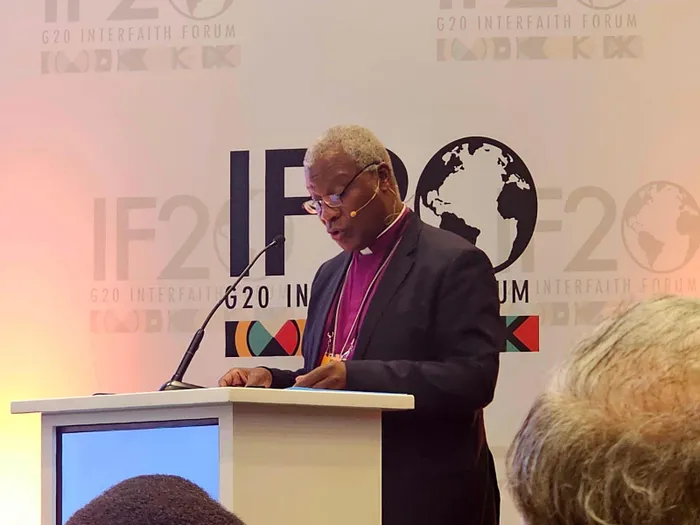G20 Interfaith Forum: Archbishop Makgoba criticises government, declares 'Ubuntu is broken'

Archbishop Thabo Makgoba, during his address, appealed to President Cyril Ramaphosa and the government to take action on the five G20 action areas.
Image: Theolin Tembo/Independent Newspapers
Archbishop Thabo Makgoba said that “Ubuntu is broken” when he delivered the keynote address at the G20 Interfaith Forum (IF20) on Monday in Cape Town, which saw several global voices committed to shaping inclusive and ethical policy coming together.
The IF20 forum convenes religious leaders, civil society organisations, government officials, multilateral institutions, and scholars to explore collaborative solutions to pressing global challenges.
The IF20 event is intended to reflect and reinforce South Africa’s G20 Presidency theme: “Solidarity, Equality, Sustainability.” The Cape Town event is intended as a catalyst for action, fostering partnerships that transcend borders, beliefs, and sectors.
Makgoba, during his address, appealed to President Cyril Ramaphosa and the government to take action on the five G20 action areas. This included food security and poverty, economic and financial action, social cohesion as a foundation for peace, migration and refugee movements, human trafficking, and religious involvement, as first responders.
“IF20’s continued work highlights extensive religious teaching and practices supporting policies and action to support those on the move, especially those who are most vulnerable,” he said.
“As South Africans, our appeal to our president, Mr Cyril Ramaphosa, and other government leaders is to prioritise these agenda points.”
“At our recent colloquium, Bishop Sithembele Sipuka, President of the South African Council of Churches (SACC), emphasised that ‘food security is not just about calories, it is about Ubuntu, and our interconnected humanity. When children die of malnutrition, while food rots in warehouses, when fertile land lies barren…when communities that once fed themselves have to depend on handouts, our Ubuntu is broken’."
“When government, business, and faith communities work together with mutual respect and shared responsibility, we then treat people as agents rather than objects,” Makgoba said.
“When we build systems that empower rather than create dependency, then we restore not just food security, but human dignity.
“Our appeal should be, firstly, to our government. Use the G20 platform to champion, not just emergency relief, but sustainable food systems that empower people. Learn from Brazil’s success, but adapt solutions to our African context.”
Makgoba said that this entails providing enough budget allocation for agriculture and addressing partnerships between the government and civil society. He said that the government often uses the approach of tackling the problem alone, "systematically excluding churches and faith communities from programme implementation, opting for isolation over collaboration".
“Faith communities have the organisational structure and unwavering commitment to provide social services, and advance the development that the government so desperately needs. We are present in every corner of the country, in cities and the most rural (and) remote areas, where government services barely reach,” Makgoba said.
“More importantly, we have deep personal connections with communities that most government officials cannot replicate. Instead of viewing faith communities as competitors or obstacles, the government should provide funding and support to leverage our existing infrastructure and community trust.”
Makgoba urged business leaders to go beyond making donations and focus on partnering with communities to build sustainable livelihoods. He encouraged the faith leaders to focus on empowering people.
“We can either continue the cycle of dependency or choose the more challenging, but dignifying path of empowerment. Our people are ready for this change, the real question is, are we, as churches, and faith leaders, to lead them?”
He also called out the political elites, and “those close to power, who live in a luxury bubble of affluence, absorbing national resources” while the vulnerable struggle to survive.
“Pump resources into the life-enhancing programmes, and strengthen peacemaking efforts to stop violent conflicts…Our faith demands of us that worship should drive us from our knees, and send us out from our churches, mosques and temples to engage the world and ensure our Creator’s intentions are fulfilled.”
theolin.tembo@inl.co.za
Related Topics: